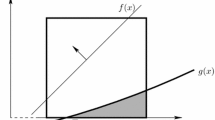Abstract
In branch and bound algorithms in constrained global optimization, a sharp upper bound on the global optimum is important for the overall efficiency of the branch and bound process. Software to find local optimizers, using floating point arithmetic, often computes an approximately feasible point close to an actual global optimizer. Not mathematically rigorous algorithms can simply evaluate the objective at such points to obtain approximate upper bounds. However, such points may actually be slightly infeasible, and the corresponding objective values may be slightly smaller than the global optimum. A consequence is that actual optimizers are occasionally missed, while the algorithm returns an approximate optimum and corresponding approximate optimizer that is occasionally far away from an actual global optimizer. In mathematically rigorous algorithms, objective values are accepted as upper bounds only if the point of evaluation is proven to be feasible. Such computational proofs of feasibility have been weak points in mathematically rigorous algorithms. This paper first reviews previously proposed automatic proofs of feasibility, then proposes an alternative technique. The alternative technique is tried on a test set that caused trouble for previous techniques, and is also employed in a mathematically rigorous branch and bound algorithm on that test set.

Similar content being viewed by others
Notes
Assuming, of course, there are no programming errors.
References
Adjiman, C.S., Dallwig, S., Floudas, C.A., Neumaier, A.: A global optimization method, \(\alpha \)BB, for general twice-differentiable constrained NLPs I. Theoretical advances. Comput. Chem. Eng. 22(9), 1137–1158 (1998)
Fletcher, R., Leyffer, S.: Nonlinear programming without a penalty function. Math. Prog. 91(2), 239–269 (2002)
Floudas, C.: Deterministic global optimization: advances and challenges. In: Plenary Lecture, First World Congress on Global Optimization in Engineering and Sciences, WCGO (2009)
Kearfott, R.B.: Rigorous global search: continuous problems. Number 13 in nonconvex optimization and its applications. Kluwer, Dordrecht (1996)
Kearfott, R.B.: On proving existence of feasible points in equality constrained optimization problems. Math. Program. 83(1), 89–100 (1998)
Kearfott, R.B.: GlobSol user guide. Optim. Methods Softw. 24(4–5), 687–708 (2009)
Kearfott, R.B.: Interval computations, rigour and non-rigour in deterministic continuous global optimization. Optim. Methods Softw. 26(2), 259–279 (2011)
Kearfott, R.B., Castille, J.M., Tyagi, G.: Assessment of a non-adaptive deterministic global optimization algorithm for problems with low-dimensional non-convex subspaces, accepted for publication in Optim. Methods Softw. 29(2), 430–441 (2014)
Kearfott, R.B., Muniswamy, S., Wang, Y., Li, X., Wang, Q.: On smooth reformulations and direct non-smooth computations in global optimization for minimax problems. J. Global Optim. 57(4), 1091–1111 (2013)
Neumaier, A.: COCONUT Web page, 2001–2003. http://www.mat.univie.ac.at/~neum/glopt/coconut
Ninin, J., Messine, F., Hansen, P.: A reliable affine relaxation method for global optimization, Rapport de recherche, RT-APO-10-05, IRIT. ftp://ftp.irit.fr/IRIT/APO/RT-APO-10-05.pdf (2010). Accessed March 2010
Ninin, J., Messine, F.: A metaheuristic methodology based on the limitation of the memory of interval branch and bound algorithms. J. Global Optim. 50(4), 629–644 (2011)
Sahinidis, N.V.: BARON: A general purpose global optimization software package. J. Global Optim. 8(2), 201–205 (1996)
Shcherbina, O., Neumaier, A., Sam-Haroud, D., Vu, X.-H., Nguyen, T.-V.: Benchmarking global optimization and constraint satisfaction codes. In: Bliek, C., Jermann, C., Neumaier, A. (eds.) COCOS, Volume 2861 of Lecture Notes in Computer Science, pp. 211–222. Springer, Berlin (2003)
Wächter, A.: Homepage of IPOPT, 2002. https://projects.coin-or.org/Ipopt
Wächter, A., Biegler, L.T.: Line search filter methods for nonlinear programming: local convergence. SIAM J. Optim. 16(1), 32–48 (2005)
Wächter, A., Biegler, L.T.: Line search filter methods for nonlinear programming: motivation and global convergence. SIAM J. Optim. 16(1), 1–31 (2005)
Acknowledgments
I wish to thank the referees for their numerous comments that substantially improved the content of this work.
Author information
Authors and Affiliations
Corresponding author
Rights and permissions
About this article
Cite this article
Kearfott, R.B. On rigorous upper bounds to a global optimum. J Glob Optim 59, 459–476 (2014). https://doi.org/10.1007/s10898-014-0173-3
Received:
Accepted:
Published:
Issue Date:
DOI: https://doi.org/10.1007/s10898-014-0173-3




